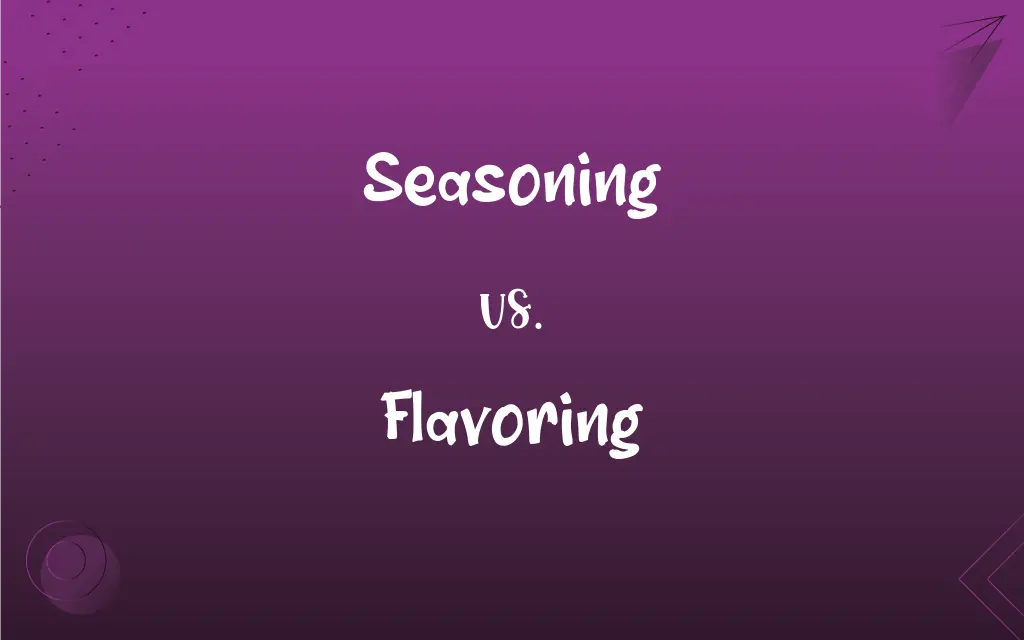Seasoning vs. Flavoring: What's the Difference?
Edited by Aimie Carlson || By Janet White || Published on February 7, 2024
Seasoning enhances the natural taste of food, often with salt, herbs, or spices, while flavoring adds a new taste or aroma, often using extracts or artificial flavors.

Key Differences
Seasoning involves adding ingredients like salt, herbs, and spices to food to enhance its natural flavor. Flavoring, however, introduces new flavors or aromas to a dish, often through extracts, essences, or artificial flavors.
The purpose of seasoning is to bring out the inherent flavors of the food, not to overpower them. In contrast, flavoring aims to impart a distinct taste or aroma, which may be different from the food's original flavor.
Common seasonings include salt, pepper, garlic, and onion powder. Flavorings, on the other hand, range from vanilla and almond extracts to artificial flavorings like monosodium glutamate (MSG).
Seasoning is typically used in smaller quantities and is integrated during the cooking process. Flavoring can be added at any stage, and its quantity varies depending on the desired intensity of flavor.
Seasoning is a key component in culinary traditions worldwide, focusing on enhancing natural tastes. Flavoring plays a crucial role in creating specific tastes, especially in confectionery and beverage industries.
ADVERTISEMENT
Comparison Chart
Purpose
Enhances natural taste of food.
Adds new taste or aroma.
Common Examples
Salt, herbs, spices.
Extracts, essences, artificial flavors.
Usage Quantity
Used in smaller amounts.
Quantity varies widely.
Application Stage
Often during cooking.
Can be added at any stage.
Role in Cooking
Integral to culinary traditions.
Essential in creating specific flavors.
ADVERTISEMENT
Seasoning and Flavoring Definitions
Seasoning
Seasoning can be a mix of spices for specific cuisines.
The chef used an Italian seasoning blend for the pasta sauce.
Flavoring
Flavoring can include natural or artificial substances.
The beverage was enhanced with artificial strawberry flavoring.
Seasoning
Seasoning is essential in cooking for flavor development.
The soup lacked depth until he adjusted the seasoning.
Flavoring
Flavoring is used to create specific taste profiles.
Mint flavoring gave the chocolate a refreshing twist.
Seasoning
Seasoning often involves adding small, precise amounts.
A pinch of seasoning can drastically improve a dish's taste.
Flavoring
Flavoring means adding elements that impart new tastes.
She added vanilla flavoring to the cake batter.
Seasoning
Seasoning refers to adding herbs, spices, or salt to enhance flavor.
She seasoned the chicken with salt and rosemary.
Flavoring
Flavoring can transform the overall taste of a dish.
Almond flavoring turned the ordinary cookies into something special.
Seasoning
Seasoning enhances the natural flavors of food.
Proper seasoning brought out the sweetness of the roasted vegetables.
Flavoring
Flavoring often refers to concentrated extracts.
Lemon flavoring was key to the dessert's citrus aroma.
Seasoning
Something, such as a spice or herb, used to flavor food. Also called seasoner.
Flavoring
A substance, such as an extract or spice, that imparts flavor.
Seasoning
The act or process by which something is seasoned.
Flavoring
(American spelling) Something that gives flavor, usually a food ingredient.
This soda has an artificial flavoring, I can taste the after taste.
Flavoring
Present participle of flavor
Flavoring
Something added to food primarily for the savor it imparts.
Flavoring
Something added to food primarily for the savor it imparts
FAQs
Are flavorings always artificial?
Flavorings can be both natural and artificial.
What does flavoring mean?
Flavoring refers to adding new tastes or aromas to food.
Can seasoning change the food's original taste?
Seasoning enhances, rather than changes, the original taste.
Can flavoring be used in savory dishes?
Yes, flavorings are used in both savory and sweet dishes.
Should seasoning be added before or after cooking?
It can be added at both stages, depending on the dish.
Is salt considered a seasoning?
Yes, salt is a fundamental seasoning.
Does seasoning include herbs?
Yes, herbs are a key part of seasoning.
What is seasoning in cooking?
Seasoning involves adding salt, herbs, or spices to enhance food's natural flavors.
Is pepper a type of seasoning?
Yes, pepper is a common seasoning.
What's an example of a natural flavoring?
Vanilla extract is a natural flavoring.
Can seasoning be overdone?
Yes, excessive seasoning can overpower a dish.
Are flavorings used in baking?
Yes, flavorings are widely used in baking.
Is lemon juice a flavoring?
Lemon juice can act as both a seasoning and a flavoring.
Do flavorings include spices?
Flavorings usually refer to extracts or chemical compounds, not spices.
Can flavorings expire?
Yes, flavorings, especially natural extracts, can lose potency over time.
Can you season with garlic?
Yes, garlic is a popular seasoning.
How does seasoning affect food texture?
Seasoning typically doesn't affect texture.
Is seasoning necessary in cooking?
Seasoning is crucial for enhancing the taste of food.
How do you choose a flavoring?
Choose based on the desired taste and aroma of the dish.
Is chocolate a flavoring?
Chocolate can be used as a flavoring in various forms.
About Author
Written by
Janet WhiteJanet White has been an esteemed writer and blogger for Difference Wiki. Holding a Master's degree in Science and Medical Journalism from the prestigious Boston University, she has consistently demonstrated her expertise and passion for her field. When she's not immersed in her work, Janet relishes her time exercising, delving into a good book, and cherishing moments with friends and family.
Edited by
Aimie CarlsonAimie Carlson, holding a master's degree in English literature, is a fervent English language enthusiast. She lends her writing talents to Difference Wiki, a prominent website that specializes in comparisons, offering readers insightful analyses that both captivate and inform.































































